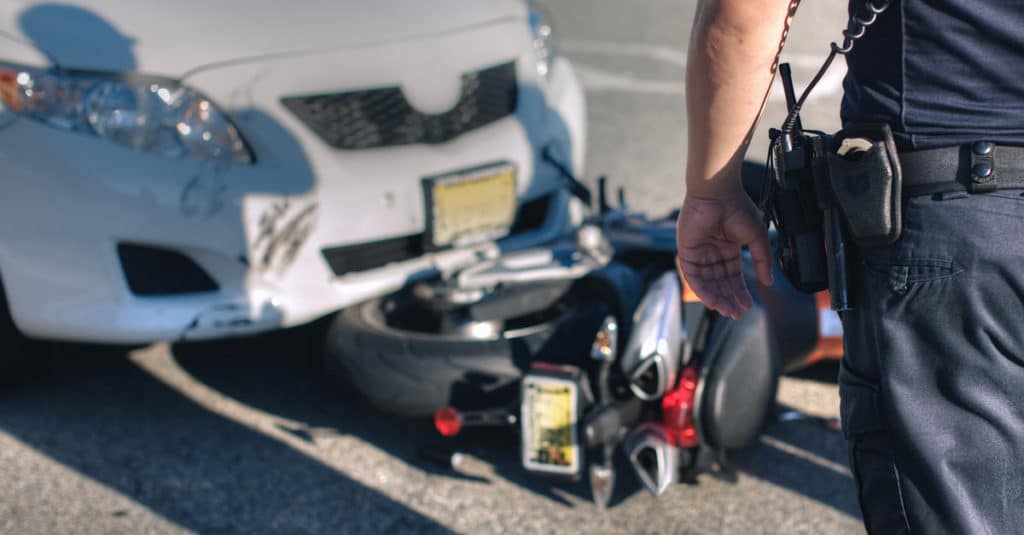Florida motorcycle helmet laws apply to all riders in the state. However, helmets are not required in all circumstances. If Florida helmet laws apply to you, the helmet you wear must meet U.S. Department of Transportation (USDOT) standards. Our Florida motorcycle accident attorneys explain helmet laws.
What Is Florida’s Helmet Law for Motorcycle Riders?
The motorcycle helmet law in the State of Florida is Florida Statutes § 316.2111. This law states that helmets are required unless the operator is over the age of 21 and they have insurance that provides at least $10,000 in medical benefits.
If a rider does not meet the age requirement or does not have the required insurance, they must wear a motorcycle helmet. And when a rider is required to wear a helmet, it must be USDOT compliant.
Have you been injured in a motorcycle accident? Contact our team of experienced motorcycle accident attorneys for a free consultation.
Are There Exceptions to Florida’s Motorcycle Helmet Law?
Are motorcycle helmets mandatory in Florida? Exceptions to Florida’s motorcycle helmet law are:
- Riders 21+ years old who have $10,000 in medical insurance benefits
- Persons riding in an enclosed cab
- Anyone 16+ operating a bike/moped with 50cc displacement or less
- Anyone 16+ operating a moped with not more than two brake horsepower (BHP) that can only go up to 30 mph
All individuals under 16 riding a moped must always use a USDOT-approved helmet.
Complying with Florida’s Motorcycle Insurance Exception
Remember, to meet the $10,000 insurance exception, medical insurance must provide benefits specifically for motorcycle crashes. Florida doesn’t require motorcycle insurance, and your Florida PIP vehicle coverage doesn’t automatically cover your motorcycle. Be sure you have a policy that specifically covers the use of your motorcycle.
When Did Florida Repeal Its Motorcycle Helmet Law?
Florida repealed its motorcycle helmet law on July 1, 2020. The previous law required all riders to wear a helmet. With this change, some riders can legally operate a motorcycle without wearing a helmet.
Is Florida’s Motorcycle Helmet Law Constitutional?
The U.S. Court of Appeals upheld the constitutionality of Florida’s motorcycle helmet laws in Picou v. Gillum, 874 F.2d 1519 (11th Cir. 1989)2. The case challenged the law on the grounds of due process, equal protection, and privacy.
The court said that although using a motorcycle helmet is a personal decision, those injured in accidents use public services like ambulances and law enforcement. If they are disabled, they may access public benefits. The court said that although the purpose of the law is to prevent harm to the motorcycle rider, there is a benefit to the public.
Motorcycle helmet laws have been upheld throughout the United States as a valid exercise of police power.
Is Eye Protection Required for Motorcyclists in Florida?
Yes, eye protection is required for motorcycle operators in Florida. The motorcycle helmet law states that operators must wear eye protection. Unlike the helmet law, there is no exception for age or insurance. All operators must wear eye protection.
What Is the Penalty for Operating a Motorcycle Without a Helmet in Florida?
Operating a motorcycle without a helmet in Florida is a non-criminal, non-moving violation. The operator receives a ticket and pays a fine.
Florida Motorcycle Helmet Laws and Car Accident Compensation
As accident lawyers, we understand that a motorcyclist failing to wear a helmet may be of great importance in the event of an accident. After all, according to the Centers for Disease Control, helmet use reduces the risk of death to a motorcyclist by 37%3. In addition, helmet use reduces the risk of head injury by 69%.
No doubt, motorcycle helmet use improves safety and operator outcomes in the event of an accident. However – use is not mandatory in all circumstances in Florida. Motorcyclists can be entirely within their rights to decline to use a helmet, understanding the additional risk of injury.
What impact does the decision not to wear a helmet have on compensation for an accident? Can a victim without a helmet receive compensation for all their damages, just like a victim wearing the helmet? If there is a reduction in damages, how does it work legally? In Florida, the answer remains unclear.
Comparative Negligence and Motorcycle Accidents
When it comes to seatbelts for car operators, there is a specific law that addresses comparative negligence. Florida law § 316.614(10)4 says that a jury may view failing to use a seatbelt as comparative negligence. (Also see Smith v. Butterick, 769 So.2d 1056, 1058-69 (Fla.2d D.C.A. 2000)5).
However, the seatbelt law is different from the motorcycle law in two respects. First, the law requires that all drivers wear a seatbelt except those with a medical condition. Second, there is a specific law allowing the jury to apply comparative negligence. These two things do not exist for motorcycle laws.
Even with a helmet, motorcycle riders can be injured on the road due to another driver’s negligence. Contact our motorcycle accident attorneys to learn more about your rights.
However, that doesn’t necessarily mean that the courts will not apply principles of comparative negligence to motorcycle accident cases. In addition to being considered comparative negligence, it may also be treated as a failure to mitigate damages. With the State of Florida using pure comparative negligence, the two different takes could produce a similar dollar result in compensation.
See De Los Santos v. Brink, SD13-3833 (2015)6 for an example of a case where the court entertained arguments that failure to wear a helmet along with road rage amounted to comparative negligence in a motorcycle accident claim.
Not Wearing a Helmet and Claiming Compensation
As a litigant, it’s important to be ready for comparative negligence arguments. Know that even if you were not wearing a helmet, Florida comparative negligence laws may still give you a good case for financial compensation. Your attorney should be prepared to advocate for your interests and argue for developments in the law that are in your favor.
While comparative negligence may play a role in your case, it’s essential to work with an experienced attorney who is aware of developments in the law and who can pursue your interests before the judge and jury.
Florida Motorcycle Accident Attorneys
Have you been in an accident? Are you wondering, “Is there a motorcycle accident lawyer near me I can trust?” Remember, even if you weren’t wearing a helmet, you may deserve financial compensation. You have important rights. Contact the most experienced motorcycle accident attorneys Tampa has to offer to talk about your case.
Sources:
2Picou v. Gillum, 874 F.2d 1519 (11th Cir. 1989)
3Centers for Disease Control and Prevention (CDC). Motorcycle Safety.
4FLA. STAT. § 316.614 (10) (2021)
5Smith v. Butterick, 769 So.2d 1056, 1058-69 (Fla.2d D.C.A. 2000)




